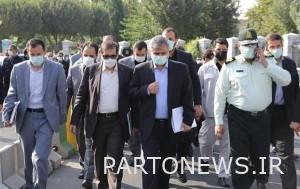Judiciary »Tehran Prosecutor’s field visit to the plan to organize and clean up the areas of Shush, Molavi and Harandi

According to the public relations of the Tehran Public and Revolutionary Prosecutor’s Office, Dr. Ali Al-Qasi, the Tehran Public and Revolutionary Prosecutor, visited the implementation of the plan to organize and clean up the areas of Shush, Molavi and Harandi and attended the cleaned license plates.
It is worth mentioning that Sardar Rahimi, the respected police commander of Greater Tehran, Sardar Yazdi, the commander of the Prophet’s Corps, Sardar Hadavand and several respected officials of the Tehran Municipality were also present during this visit.
At first, the Tehran prosecutor appeared at the cleaned license plates and talked to a number of residents of these areas about the problems and difficulties of living in these neighborhoods, and then while attending the 116th Molavi police station with a group of military and police commanders and other city officials of Greater Tehran. They held a meeting focusing on the quality and implementation of the project.
At the beginning of the meeting, Sardar Rahimi, Commander of the Greater Tehran Police Force, spoke and explained how the plan to clean up these areas was implemented, and the diligent support, follow-up and assistance of the Tehran Public Prosecutor and Revolution Dr. Al-Qasi, as well as the efforts of the Deputy The Tehran Prosecutor and the head of the District 24 (Drugs) Prosecutor’s Office, Mehrangiz, praised and thanked.
Then, Dr. Al-Qasi, the Public Prosecutor of Tehran, during his speech, while condoling the mourning days of Hazrat Aba Abda … (AS), thanked and appreciated the presence of the guests of this meeting in the cleansing plan and noted: In addition to the legal duty, this created another task for us to follow the order of the Guardian of the Muslims of the world and to clear these areas as soon as possible; In line with His Majesty’s orders, the esteemed head of the judiciary also gave a special mission to me to enter into this issue, because it is not accepted that some areas of Tehran become the center of crime and harm.
He added: “From a criminological point of view, in crime, various factors are involved in the harms caused by crimes, and only the guilty person should not be considered.” In committing a crime, the perpetrator, the state in the general sense, and society and the victim are involved and involved; For this reason, the problem will not be solved only by collecting drug addicts by the police, and this is only dealing with the disabled, while in the law, the duties of all agencies are specified and all responsible agencies and those responsible for building society should be Are to enter into this important.
He further pointed out: The Judiciary has prepared a plan in the field of addiction in terms of monitoring and pursuing public rights and the Tehran Prosecutor’s Office, in which the duties of the three agencies that are directly involved in this field will be specified and soon They are communicated; These agencies include the governor’s office, the municipality, the prosecutor’s office and the court, the Anti-Narcotics Coordination Council, the Welfare Department, the Disciplinary Command, the medical sciences, the prison and the IRGC. A device that does not perform its duties will be dealt with according to the law.
Noting that some agencies have not taken due care of their duties, the Tehran prosecutor added: “These areas should be insecure for drug dealers, and it is not acceptable for some areas of Tehran to become public centers of crime and harm.” ; The law provides for performance guarantees for devices.
He also reminded the duties of the municipality in this particular case and emphasized on acquiring the surrounding areas as soon as possible and also securing these neighborhoods before the start of the cold season.
The Tehran prosecutor announced the collection of more than 3,000 addicts during the implementation of the project and said: “These addicts have been transferred to rehabilitation centers and have been treated in accordance with health protocols, but the capacity of these centers should also be increased.”
In the end, Dr. Al-Qasi emphasized on the continuation of these inspections and arrests and dealing with violators and lawbreakers, and added: And in the Tehran courthouse, special branches have been assigned to deal decisively with the detainees.
In the end, it was decided that the Tehran Prosecutor’s Office should inform the duties of each department in the plan of organizing and clearing the areas of Shousha, Molavi and Harandi, and the involved agencies should send their suggestions to the Tehran Prosecutor’s Office. It is noteworthy that the implementation of the project has had good effects and good results, so that some residents of the region in the face of the prosecutor, expressed their satisfaction.

